| Srl | Item |
| 1 |
ID:
066947
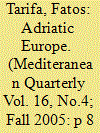

|
|
|
| 2 |
ID:
124336
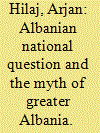

|
|
|
|
|
| Publication |
2013.
|
| Summary/Abstract |
To know what the Albanian National Question (ANQ) is, one should learn it not from what its neighbors, namely Serbia and Greece, have to say, but from a more direct and reliable source, the voice of the Albanians themselves. No nation is in a position in which it can express in a realistic way the needs, rights and aspirations of a different nation in the same way as an individual cannot be an exact representative for anyone but himself. For many years the Western countries used to rely on either Serbian or Greek lenses for the ANQ. In the late 1990s the U.S.-led intervention against Serbia over Kosovo on humanitarian grounds and the Albanian insurgency in Macedonia has contributed to an altered power balance in the region. The neighbors frightened by the power shift in the Southern Balkans use their propaganda machinery to express the danger posed by the alleged Greater Albania scheme in order to demonize and morally downgrade the ANQ. However, one can easily see that Albanians since the creation of their state have not, are not, and will not pursue an irredentist agenda toward their neighbors.
|
|
|
|
|
|
|
|
|
|
|
|
|
|
|
|
| 3 |
ID:
139707
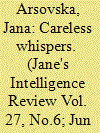

|
|
|
| 4 |
ID:
106221
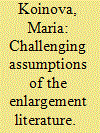

|
|
|
|
|
| Publication |
2011.
|
| Summary/Abstract |
This article argues that from the very start of the transition process in Macedonia, a fusion of concerns about security and democratisation locked local nationalist elites and international organisations intoa political dynamic that prioritised security over democratisation. This dynamic resulted in little progress in the implementation of human and minority rights until 2009, despite heavy EU involvement in Macedonia after the internal warfare of 2001. The effects of this informally institutionalised relationship have been overlooked by scholarship on EU enlargement towards Eastern Europe, which has made generalisations based on assumptions relevant to the democratisation of countries in Eastern Europe, but not the Western Balkans.
|
|
|
|
|
|
|
|
|
|
|
|
|
|
|
|
| 5 |
ID:
052315
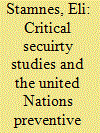

|
|
|
|
|
| Publication |
Spring 2004.
|
| Summary/Abstract |
This essay takes as it starting point that meta-theoretical assumptions affect our analyses of UN peace operations and have normative consequences. It demonstrates how this fact could be taken into account in such analyses by introducing an approach to the study of security - Critical Security Studies (CSS) - and by showing how the central ideas of this approach may be fitted into an alternative framework for analysis. This framework is based on the method of immanent critique and is in particular concerned with conceptions of security and human emancipation. An illustration of how this framework can be utilized to study the UN's preventive deployment in Macedonia is then provided. It is argued that some of this UN operation's activities can be regarded as contributions to a process of emancipation in Macedonia
|
|
|
|
|
|
|
|
|
|
|
|
|
|
|
|
| 6 |
ID:
021780
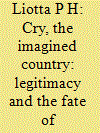

|
|
|
|
|
| Publication |
Spring 2001.
|
| Description |
49-80
|
|
|
|
|
|
|
|
|
|
|
|
|
|
|
|
| 7 |
ID:
122778
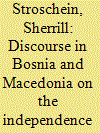

|
|
|
|
|
| Publication |
2013.
|
| Summary/Abstract |
Bosnia and Macedonia declared independence from Yugoslavia in 1991 and 1992, and subsequent referenda legitimised these declarations, but unitary state actors did not emerge. Rather, Bosnia and Macedonia each contain groups with divisive views regarding the nature of the state in which they live. Kosovo is regularly invoked as an example in their contentious discussions. In this essay, I present a framework for understanding this discursive contention in which Kosovo provides the focus for disputes between extremists and moderates of different groups. Within the two states, groups differ over the recognition of Kosovo's declaration of independence and the question of whether this might constitute a precedent. A political, rather than simply a legal, view on these discussions helps us to better understand not only these dynamics, but similar contestations unfolding elsewhere.
|
|
|
|
|
|
|
|
|
|
|
|
|
|
|
|
| 8 |
ID:
011344
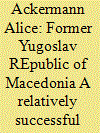

|
|
|
|
|
| Publication |
Dec 1996.
|
| Description |
409-424
|
|
|
|
|
|
|
|
|
|
|
|
|
|
|
|
| 9 |
ID:
113293
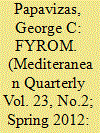

|
|
|
|
|
| Publication |
2012.
|
| Summary/Abstract |
In the post-Cold War reality, stability in the Balkans must be of great importance. It is therefore imperative to examine the nature of the region's instabilities as well as their sources and their implications. The Former Yugoslav Republic of Macedonia (FYROM) has been praised by the West as a good example of stability. However, because of several systemic weaknesses-past habits acquired during fifty years of communism-FYROM has become and will always be a destabilizing force, especially if it continues to pursue the expropriation of the Hellenic Macedonian name and ethnicity, the intensification of its illiberal history revisionism, the expropriation of the Bulgarian language and parts of Bulgarian history, and the mistreatment of minorities.
|
|
|
|
|
|
|
|
|
|
|
|
|
|
|
|
| 10 |
ID:
113885
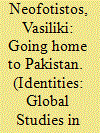

|
|
|
|
|
| Publication |
2011.
|
| Summary/Abstract |
In this article I explore the claim that post-independence Macedonia is a cornerstone of European civilization (a traditional Greek claim) and analyze efforts to assert the country's position in the international arena as a "modern" and authentically Western state deserving of membership in the European Union. Such efforts involve the establishment of ties between Macedonians and the Hunzukuts, who live on the remote Hindu Kush Mountains in Pakistan and claim to be descendants of Alexander the Great. I also analyze comparable initiatives, sponsored in recent years by the Greek state, to prove ties between Greeks and the Kalasha, who also live in remote areas of Pakistan and believe that they are descended from Alexander the Great. Greece and post-independence Macedonia offer us insights into the populist underpinnings of the nationalist promotion of a European identity presented as rooted in the East.
|
|
|
|
|
|
|
|
|
|
|
|
|
|
|
|
| 11 |
ID:
133581
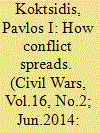

|
|
|
|
|
| Publication |
2014.
|
| Summary/Abstract |
This article examines the escalation of protest mobilization into armed conflict in the Republic of Macedonia (2001). The analysis argues that violence occurred because of a timely collusion between proximate causes and permissive conditions (causes). The state's inherent fragility and the perpetuation of unresolved grievances provided ground for the utilization of opportunity structures by dissident contestants. The study looks into the influence of spillover effects through the lens of contagion and diffusion effects including political radicalization, disputed borderlands refugee flows, and rebel capacity, and provides an assessment of the conditions shaping the decision of the Albanian rebels to use violence. Drawing from a series of elite interviews and documents, the article offers a critical insight into how ethno-regional interdependencies render a largely non-violent conflict susceptible to escalation. The study finds that contagion, disputed borderlands, and the availability of existing operational networks have played a crucial, if not decisive, role in the decision of politically active Albanians in the Republic of Macedonia to use violence.
|
|
|
|
|
|
|
|
|
|
|
|
|
|
|
|
| 12 |
ID:
124157
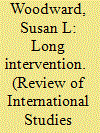

|
|
|
|
|
| Publication |
2013.
|
| Summary/Abstract |
Great Power intervention in the Balkans since the late nineteenth century shows a striking continuity in motivations, methods, and consequences. The article proposes that current intervention practices are largely a response to the Balkan theatre in the 1990s and thus institutionalise this continuity more than arguments about normative and institutional change since 1990 suggest. Three continuities are emphasised: the concept of a 'turbulent frontier' to explain an unintended dynamic of nearly continuous intervention, the importance of local actors' interests (the pull of intervention) alongside those of major power interests (the push), and the primary influence on domestic orders and cause of the 'turbulence' of economic relations.
|
|
|
|
|
|
|
|
|
|
|
|
|
|
|
|
| 13 |
ID:
021654
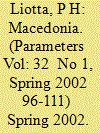

|
|
|
|
|
| Publication |
Spring 2002.
|
| Description |
96-111
|
|
|
|
|
|
|
|
|
|
|
|
|
|
|
|
| 14 |
ID:
148597
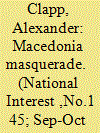

|
|
|
|
|
| Summary/Abstract |
THE REPUBLIC of Macedonia may be the most perplexing country in Europe. Crossing the border, you are informed via text message that you have entered the “cradle of civilization.” Billboards lining major highways are defiant: “This is Macedonia!” It is the only part of Yugoslavia that did not experience significant bloodshed. It is also the only country in Europe, apart from Romania, where every ethnic minority is guaranteed parliamentary representation. And yet Macedonia is not a success story, but one of how a country the size of Vermont has navigated its way back from the shoals of one disaster after another. In 1992, its economy was devastated by an embargo from Greece in the south and a UN-led blockade on Serbia in the north. Three years later, President Kiro Gligorov was nearly assassinated by suspects who remain at large. Then, in 1999, 360,000 refugees—a fifth of the Macedonian population—descended on the country from Kosovo. By 2001, ethnic Albanians of the National Liberation Army were beating the drums of insurgency, and in 2004 President Boris Trajkovski died in a plane crash on the day the country’s EU application was presented in Dublin.
|
|
|
|
|
|
|
|
|
|
|
|
|
|
|
|
| 15 |
ID:
020531
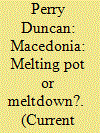

|
|
|
|
|
| Publication |
Nov 2001.
|
| Description |
362-368
|
|
|
|
|
|
|
|
|
|
|
|
|
|
|
|
| 16 |
ID:
007816
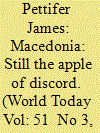

|
|
|
|
|
| Publication |
March 1995.
|
| Description |
55-58
|
|
|
|
|
|
|
|
|
|
|
|
|
|
|
|
| 17 |
ID:
019871
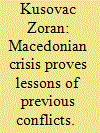

|
|
|
|
|
| Publication |
Aug 2001.
|
| Description |
22-26
|
|
|
|
|
|
|
|
|
|
|
|
|
|
|
|
| 18 |
ID:
053192
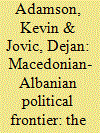

|
|
|
| 19 |
ID:
081738
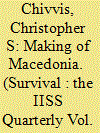

|
|
|
|
|
| Publication |
2008.
|
| Summary/Abstract |
In 2001 Macedonia's large ethnic Albanian minority revolted against the country's Slav-dominated state. In a victory for transatlantic relations, Europe and the United States worked together to defuse the crisis and avert what could easily have become another Balkan disaster. Since then, there has been progress in rebuilding Macedonia, and the EU deserves credit. This success, however, was predicated on strong US backing and the promise of NATO and EU membership. Although this has made the country something of a political hybrid, Macedonia belongs in NATO, and eventually, the European Union
|
|
|
|
|
|
|
|
|
|
|
|
|
|
|
|
| 20 |
ID:
015136
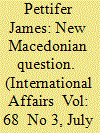

|
|
|
|
|
| Publication |
July 1992.
|
| Description |
475-485
|
|
|
|
|
|
|
|
|
|
|
|
|
|
|
|